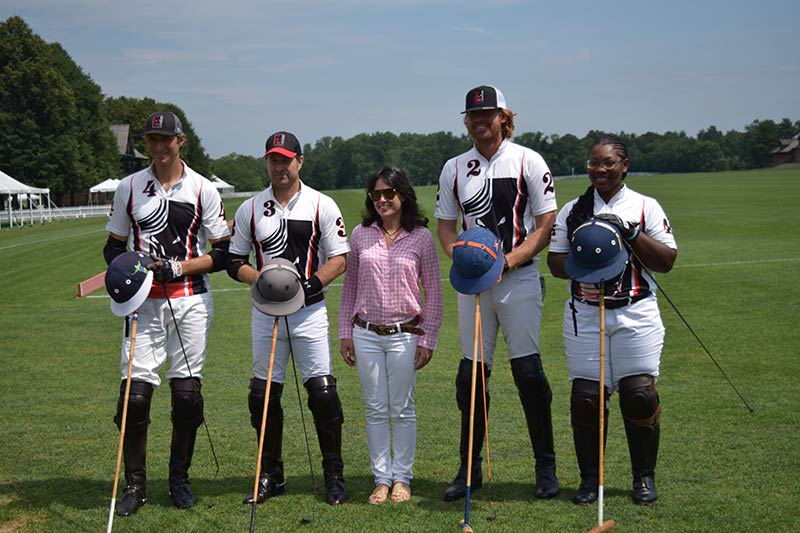 Postage Stamp farm team: Kris Kampsen, Brandon Phillips, Patron Annabelle Garret, Jao Ganon, Shariah Harris
Postage Stamp farm team: Kris Kampsen, Brandon Phillips, Patron Annabelle Garret, Jao Ganon, Shariah Harris
Life comes at you fast. And that’s just perfect for Shariah Harris, who made her debut in the sport of high goal polo this summer.
Speed is as much a part of polo as…well…stomping divots at halftime. “I love the speed,” the Cornell University student says, laughing. Polo ponies (not always ponies, but the alliteration works) race down the 300-yard field at lightning speed, chasing a ball that’s traveling at upwards of 100 miles per hour.
Fear? She’s immune. “Once you go out there and do your thing,” she explained—her thing being total focus on the action and the ball, “the nerves go away. I tell everyone to try it, because once they try it they become addicted.”
Harris was a substitute on Postage Stamp Farm’s high-goal polo team at the prestigious and very tony Greenwich Polo Club in Connecticut this summer. Her road to polo started with a wrong turn near Philadelphia’s Mann Music Center. Her mother got a little bit lost, and turned down a road that led to the Chamounix Equestrian Center. Instead of a dead end, this road opened to a world of possibilities, as Harris and her two siblings begged their mother to take a look at what was going on at the stable.
Chamounix’s Work to Ride (WTR) program offers young people the opportunity to learn to ride and to care for horses. The young people commit to working—hard--at the stables. It’s a grand bargain, as the city kids get involved in sports while discovering within themselves reserves of courage, strength, teamwork and competitiveness they didn’t know they had. Harris was just nine when she started at Chamounix. “I think my first day we learned how to clean stalls and how to groom and tack a horse.”
“I Wanted to be Like Them”
WTR stresses discipline, and aims to get kids engaged in positive activities that develop life skills and self-esteem. The combination has yielded success on many levels, and the WTR polo team has been featured in Sports Illustrated, on HBO’s Real Sports with Bryant Gumbel and The Today Show on NBC. The team has competed in Africa and Argentina, and won the National Interscholastic Polo Championship in 2011 and 2012. Founded in 1999, WTR’s polo team was the nation’s first African-American polo team.
Kids can choose from several equestrian disciplines at Chamounix, but polo was the one that most appealed to Harris. “When I watched the boys practice and play, I remember thinking I wanted to be like them,” she said. “I wasn’t scared; and that’s what helped me get better.”
She rode for two or three years, she said, before she played in an actual polo match. “It was pretty fun. We lost the match, but it was fun. And it was very competitive, which was perfect for me.”
Not every competitive equestrian has what it takes to play polo. The sport is demanding, and both physically and mentally challenging. Harris is studying large animal veterinary science--on a full polo scholarship--at Cornell University, and she thrives on the challenges polo offers. In her freshman year playing polo for Cornell, she was recognized as a Northeast All Star at the Intercollegiate Regional tournament in March. She also received top honors as the Polo Training Foundation Female Interscholastic Polo Player of the Year her senior year in high school.
From Chamounix to Greenwich
It was in her travels playing with WTR’s team that Harris met Annabelle Garrett, the Postage Stamp Farm team’s patron. She had suffered a back injury earlier in the summer and couldn’t compete in some of the scheduled matches at Greenwich. She invited Harris to play for her. Yes, it was an invitation that ultimately shattered a very expensive glass ceiling, given the fact that Harris would be the first African-American woman to play in high-goal polo. But Harris is much more than a symbol. Her academic achievements, coupled with her single-minded drive to excel at polo are far more important data points in her young life.
And then there is her fearlessness. When she first started learning to play polo, she had her share of mishaps and unanticipated dismounts. But nothing deterred her from continuing to learn. “I don’t remember being scared to do it,” she said. “The speed is the best part. You of course have issues because you’re dealing with horses, but they love it too.”
Harris applied that same sense of focus and determination to her stint with the Postage Stamp Farm team. And she saw an opportunity to learn things she could take back to her collegiate polo team. “I learned how to read the plays ahead of time,” she said. “You have to read body language and envision how the play is going to evolve before it happens. The anticipation part is what I picked up.” While the Postage Stamp Farm team didn’t win, the experience, Harris said, was wonderful.
An Ancient Game
The sport of polo has survived for more than two thousand years, its history reaching back to the sixth century BC in Persia. Despite the surfeit of noisy, sensory-overloading electronic games that are proliferating in schools, parks and even playgrounds, polo is actually gaining in popularity. The sound of horses thundering down the field, the thwack of a mallet hitting the ball and the raw speed—these are what inspire Harris and her fellow players. They’re part of history and a unique tradition.
She said that everyone who has graduated from WTR still goes back to work with, and to inspire, the kids. What would have happened if her mother had not made a wrong turn 10 years ago? “I honestly have no idea what I would be doing now,” she said.




